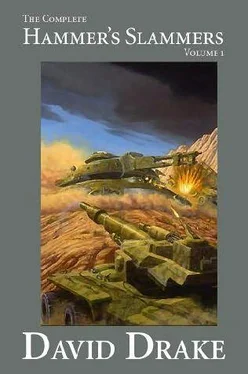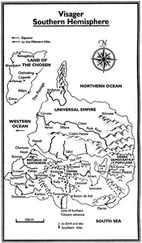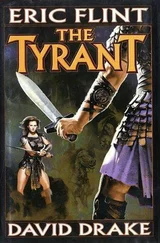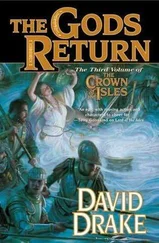"Go ahead," Margritte said, flipping a switch on her console. She had somehow been holding the French officer in conversation all the time Pritchard was on other frequencies.
"Colonel," Pritchard said, "we've got clear running through this fire. We're going to chase down everybody who used a powergun tonight; then we'll shoot them. We'll shoot everybody in their families, everybody with them in this ambush, and we'll blow up every house that anybody involved lived in. That's likely to be every house in Portela, isn't it?"
More than the heat and ions of the blazing forest distorted Benoit's face. He shouted, "Are you mad? You can't think of such a thing, Pritchard!"
The tanker's lips parted like a wolf 's. He could think of mass murder, and there were plenty of men in the Slammers who would really be willing to carry out the threat. But Pritchard wouldn't have to, because Benoit was like Riis and Schilling—too much of a nationalist to remember his first duty as a merc . . . "Colonel Benoit, the contract demands we keep the peace and stay impartial. The record shows how we treated people in Haacin for having powerguns. For what the Portelans did tonight—don't worry, we'll be impartial. And they'll never break the peace again."
"Captain, I will not allow you to massacre French civilians," Benoit stated flatly.
"Move a man out of your present positions and I'll shoot him dead," Pritchard said. "It's your choice, Colonel. Michael One out."
The Plow bucked and rolled as it pulverized fire-shattered trunks, but the vehicle was meeting nothing solid enough to slam it to a halt. Pritchard used a side block on remote to examine Benoit's encampment. The satellite's enhanced infrared showed a stream of sparks flowing from the defensive positions toward the Portela road: infantry on skimmers. The pair of larger, more diff use blobs were probably antitank guns. Benoit wasn't moving his whole battalion, only a reinforced company in a show of force to make Pritchard back off .
The fool. Nobody was going to back off now.
"Michael One to all Michael and Sigma units," Pritchard said in a voice as clear as the white flames around his tank. "We're now in a state of war with Barthe's Company and its civilian auxiliaries. Michael First, Second, and Fourth, we'll rendezvous at the ambush site as plotted on your displays. Anybody between there and Portela is fair game. If we take any fire from Portela, we go down the main drag in line and blow the cop out of it. If any of Barthe's people are in the way, we keep on sliding west. Sigma One, mount a fluid defense, don't push, and wait for help. It's coming. If this works, it's Barthe against Hammer—and that's wheat against the scythe. Acknowledged?"
As Pritchard's callboard lit green, a raspy new voice broke into the sector frequency. "Wish I was with you, panzers. We'll cover your butts and the other sectors—if anybody's dumb enough to move. Good hunting!"
"I wish you were here and not me, Colonel," Pritchard whispered, but that was to himself . . . and perhaps it was not true even in his heart. Danny's guts were very cold, and his face was as cold as death.
To Pritchard's left, a lighted display segregated the area of operations. It was a computer analog, not direct satellite coverage. Doubtful images were brightened and labeled—green for the Slammers, red for Barthe; blue for civilians unless they were fighting on one side or the other. The green dot of the Plow converged on the ambush site at the same time as the columns of First and Fourth Platoons. Second was a minute or two farther off. Pritchard's breath caught. A sheaf of narrow red lines was streaking across the display toward his tanks. Barthe had ordered his Company's artillery to support Benoit's threatened battalion.
The salvo frayed and vanished more suddenly than it had appeared. Other Slammers' vehicles had ripped the threat from the sky. Green lines darted from Hammer's own three firebases, off-screen at the analog's present scale. The fighting was no longer limited to Sector Two. If Pritchard and Hammer had played their hand right, though, it would stay limited to only the Slammers and Compagnie de Barthe. The other Francophone regiments would fear to join an unexpected battle which certainly resulted from someone's contract violation. If the breach were Hammer's, the Dutch would not be allowed to profit by the fighting. If the breach were Barthe's, anybody who joined him would be punished as sternly by the Bonding Authority.
So violent was the forest's combustion that the flames were already dying down into sparks and black ashes. The command tank growled out into the broad avenue of the road west of Haacin. Dutch trucks were still burning—fabric, lubricants, and the very paint of their frames had been ignited by the powerguns. Many of the bodies sprawled beside the vehicles were smoldering also. Some corpses still clutched their useless muskets. The dead were victims of six centuries of progress which had come to Kobold prepackaged, just in time to kill them. Barthe had given the Portelans only shoulder weapons, but even that meant the world here. The powerguns were repeaters with awesome destruction in every bolt. Without answering fire to rattle them, even untrained gunmen could be effective with weapons which shot line-straight and had no recoil. Certainly the Portelans had been effective.
Throwing ash and fire like sharks in the surf, the four behemoths of First Platoon slewed onto the road from the south. Almost simultaneously, Fourth joined through the dying hellstorm to the other side. The right of way was fifty meters wide and there was no reason to keep to the center of it. The forest, ablaze or glowing embers, held no ambushes anymore.
The Plow lurched as Kowie guided it through the bodies. Some of them were still moving. Pritchard wondered if any of the Dutch had lived through the night, but that was with the back of his mind. The Slammers were at war, and nothing else really mattered. "Triple line ahead," he ordered. "First to the left, Fourth to the right; the Plow'll take the center alone till Second joins. Second, wick up when you hit the hardball and fall in behind us. If it moves, shoot it."
At one hundred kph, the leading tanks caught the Portelans three kilometers east of their village. The settlers were in the trucks that had been hidden in the forest fringe until the fires had been started. The ambushers may not have known they were being pursued until the rearmost truck exploded. Rob Jenne had shredded it with his tribarrel at five kilometers' distance. The cyan flicker and its answering orange blast signaled the flanking tanks to fire. They had just enough parallax to be able to rake the four remaining trucks without being blocked by the one which had blown up. A few snapping discharges proved that some Portelans survived to use their new powerguns on tougher meat than before. Hits streaked ashes on the tanks' armor. No one inside noticed.
From Portela's eastern windows, children watched their parents burn.
A hose of cyan light played from a distant roof top. It touched the command tank as Kowie slewed to avoid a Portelan truck. The burst was perfectly aimed, an automatic weapon served by professionals. Professionals should have known how useless it would be against heavy armor. A vision block dulled as a few receptors fused. Jenne cursed and trod the foot-switch of the main gun. A building leaped into dazzling prominence in the microsecond flash. Then it and most of the block behind collapsed into internal fires, burying the machine gun and everything else in the neighborhood. A moment later, a salvo of Hammer's high explosive got through the calliopes' inadequate screen. The village began to spew skyward in white flashes.
The Portelans had wanted to play soldier, Pritchard thought. He had dammed up all pity for the villagers of Haacin; he would not spend it now on these folk.
Читать дальше












